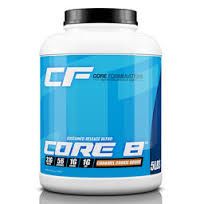 A California man has filed a protein powder class action lawsuit against Core Formulations, BioHealth Nutrition, Rogue Nutrition and others for misrepresenting the amount of protein in its products.
A California man has filed a protein powder class action lawsuit against Core Formulations, BioHealth Nutrition, Rogue Nutrition and others for misrepresenting the amount of protein in its products.
Plaintiff Bernardo DeLeon purchased Core 8 powdered protein products based on the marketed information regarding the amount and quality of the protein in them.
Core Formulations “claim to use only the purest, high-quality proteins available and the proteins in their products are sourced from the highest quality cows and made from fresh, sweet dairy whey, are 100 percent gluten-free and are produced without GMOs.”
Protein Powder Class Action Lawsuit Focuses on Numbers
According to the protein powder class action lawsuit, the Core 8 products claim to have substantially more protein in them than tests revealed.
For example, the Core Formulations Core 8 two-pound Caramel Cookie Dough flavored protein powder label claimed to have 31 grams of protein per serving. Lab test showed it only had 20.4 in one sampling and 27.1 in another.
A five-pound container of Core 8 Chocolate Brownie protein powder was labeled to contain 30 grams of protein, but lab tests showed it only contained 21 grams per serving.
Core Formulations also claims on the label: “NO PROTEIN SPIKING!! NO useless AMINO spikes like ‘Amino Acid Complex’ or ‘Taurine.’ ONLY 100% WHEY PROTEIN.”
The protein powder class action lawsuit says “The amount of protein contained in the Products is a material fact that a reasonable consumer would deem important. Had Plaintiff and the Class known that the Products contained significantly less protein that what was advertised and promoted on the product’s packaging and otherwise represented by Defendants, they would not have paid as much, if anything for the Product.”
Core Formulations Allegedly Knew the Truth
Competition is stiff for shelf space and for consumer dollars in the world of protein-packed products.
“Manufacturers, such as Defendants, aim to lower costs and increase profit margins using many methods, including the use of deceptive ‘tricks’ such as protein spiking or simply mislabeling their products so as to claim that the products have more protein than they actually do,” says the protein powder class action lawsuit.
Among the products that have tested to have less protein that advertised are Core Formulations/CF, Core 8, IsoCore, and APEX; Biohealth Precisions ISO, and Rogue Nutrition-Rogue Whey.
Additives such as amino acids added to a protein supplement can make the end product register higher for proteins that it actually contains.
The manufacturers stand accused of participating “in a scheme to maximize their profits by misrepresenting the true nature of the Products by claiming that they had more protein that they actually do in an effort to sell the product for a premium price.”
The amount of protein in the products is “heavily promoted” because the manufacturers knew consumers “would rely on these representations.”
The Protein Powder Class Action Lawsuit is Bernardo deLeon et al. v. Michael Santana, an individual and doing business as Core Formulation, and doing business as Core Formulations, and doing business as Biohealth Nutrition; B.E.A.M. Solutions Inc., a California corporation; et. al., Case No. BC611621 in the Superior Court of the State of California for the County of Los Angeles.
Join a Free Protein Powder False Advertising Class Action Lawsuit Investigation
If you purchased any of the protein powders listed below, you may qualify to file a protein powder lawsuit or protein spiking class action lawsuit.
- Core Formulations Core 8 & IsoCore
- Rogue Nutrition Rogue Whey
- BioHealth Nutrition Precision Blend & Precision Iso
ATTORNEY ADVERTISING
Top Class Actions is a Proud Member of the American Bar Association
LEGAL INFORMATION IS NOT LEGAL ADVICE
Top Class Actions Legal Statement
©2008 – 2025 Top Class Actions® LLC
Various Trademarks held by their respective owners
This website is not intended for viewing or usage by European Union citizens.














